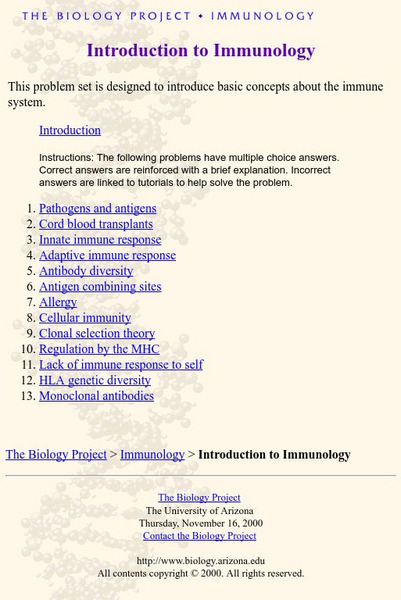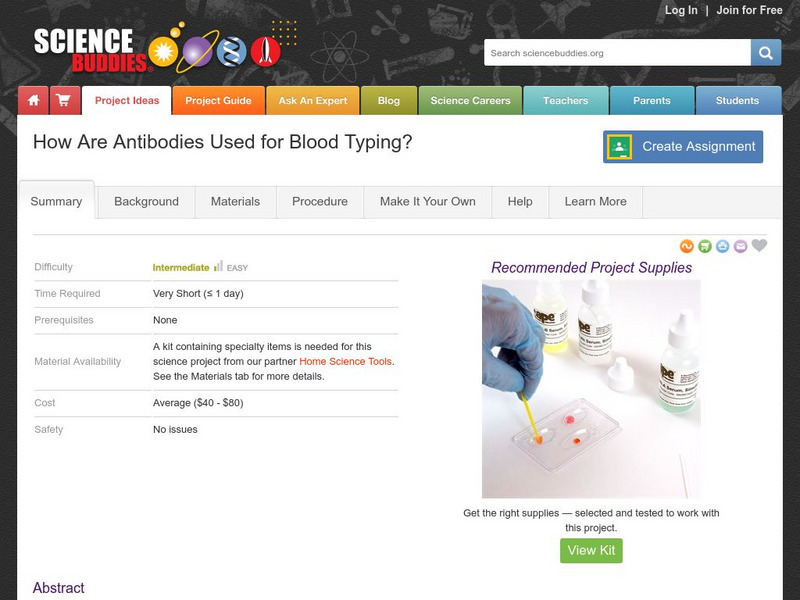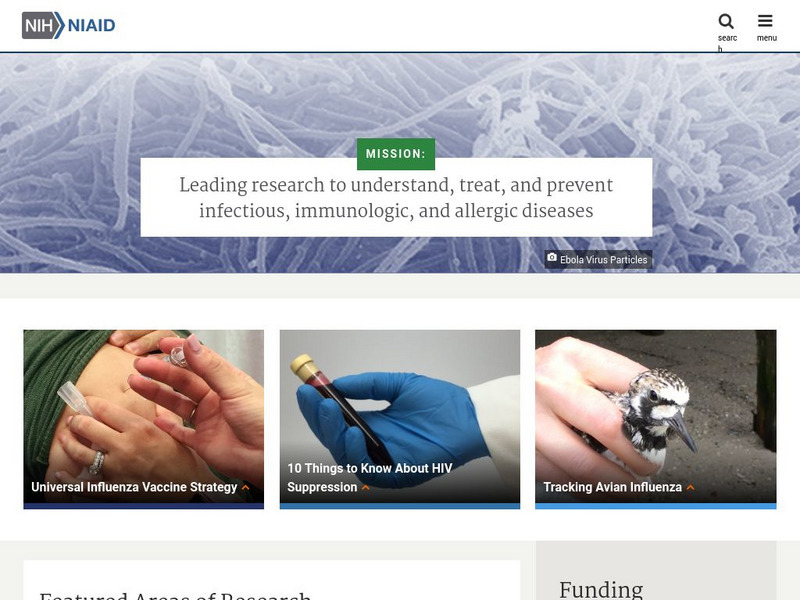Curated OER
Virus Tracker
Sixth graders will simulate the spread of a virus such as HIV through a population by "sharing" (but not drinking) the water in a plastic cup with several classmates. Although invisible, the water in a few of the cups will already be...
CK-12 Foundation
Ck 12: Life Science: 11.60 Innate Immune System
Discover the function of the innate immune system.
University of Arizona
The Biology Project: Immunology: Introduction to Immunology
This problem set introduces students to basic concepts about the immune system. Correct answers are reinforced with a brief explanation, and incorrect answers are linked to tutorials to help solve the problem.
Science Buddies
Science Buddies: How Are Antibodies Used for Blood Typing?
The human immune system has various ways of responding to an infection caused by bacteria or viruses. Our bodies produce proteins (antibodies) that are highly specific for the infectious agent as a part of our "humoral" immune response....
National Institutes of Health
National Institute of Allergy and Infectious Diseases
Get the latest government information on HIV-AIDS, allergies, the development of vaccines, and other health-related research topics.
Arizona State University
Arizona State University School of Life Sciences: Viral Attack
There are battles that are fought each day on the planet. The invading forces are those of viruses and bacteria. Left alone they would take over and destroy every cell! It is up to some key defense systems to battle and destroy these...
University of Arizona
The Biology Project: Immunology: Case Studies
Three immunology case studies for students to collaboratively diagnose using the information learned in the accompanying tutorials.
Khan Academy
Khan Academy: Ebola: At a Glance
The Ebola disease is a life-threatening illness caused by the Ebola virus. There is currently no vaccine or specific medication for Ebola. Further discussion includes How does the virus replication work?; What are the symptoms of Ebola...
Khan Academy
Khan Academy: What Is Antibiotic Resistance?
Antibiotic resistance describes a bacteria's ability to survive while being exposed to antibiotics. Topics explored are the following: How does antibiotic resistance develop exactly?; How do we measure antibiotic resistance?; How...
Khan Academy
Khan Academy: Antibiotics: An Overview
An overview of antibiotics, including What are antibiotics?; How were antibiotics discovered?; How do antibiotics work?; Azithromycin; Antibiotic development?
University of Arizona
The Biology Project: Immunology: Antibody Structure
A short tutorial illustrating the structure of the antibody, describing how the structure fosters its function.
Nobel Media AB
The Nobel Prize: Nobel Prize in Physiology or Medicine 1905 Presentation Speech
This site from the Nobel e-Museum contains a speech, originally given in 1905, in which Count K.A.H. Morner praises Robert Koch for his contribution to the world of medicine and awards Koch with the Nobel Prize.
National Institutes of Health
Niehs: Enfermedades Provocados Por El Ambiente De a a Z
An A to Z list of illnesses and disorders caused by environmental factors, e.g., asthma, allergies, mercury poisoning, cancer and others. Each is listed with a short, one paragraph overview of the condition and causes.
University of Arizona
The Biology Project: Immunology: Hiv and Aids Tutorial
Read this illustrated tutorial about the relationship between the HIV virus and AIDS. Also contains treatment and diagnosis information.
Mayo Clinic
Mayo Clinic: Food Allergies
This site from the MayoClinic.com contains great information on the food allergy. The sections that are covered in the article include: signs and symptoms, causes, risk factors, screening, diagnosis, treatment and prevention.
CK-12 Foundation
Ck 12: Life Science: 11.58 Autoimmune Disease
Learn about some autoimmune disorders that affect human health.
Khan Academy
Khan Academy: What Is Malaria?
Malaria is an infectious disease caused by a parasite called Plasmodium that invades red blood cells and liver cells. The parasites are transferred to humans by the bite of an infected Anopheles mosquito. The article discusses how...
Khan Academy
Khan Academy: The Basics of Malaria
An overview of malaria and the types of Plasmodium that is carried by the Anopheles mosquito infecting red blood cells and liver cells in the human body. Symptoms of malaria are also discussed.
Khan Academy
Khan Academy: Diagnosing Malaria
The three-step process of diagnosing malaria is explained.
Khan Academy
Khan Academy: Treatment of Malaria
After malaria has been confirmed by lab or biochemical diagnosis, treatment must begin immediately. But first the type of Plasmodium causing the infection, whether the patient has severe or non-severe infection, and if the parasite is...
Khan Academy
Khan Academy: Preventing Malaria
An overview of how to prevent getting malaria including insecticides, repellents, eliminating mosquito breeding areas, malaria prophylactic drugs.
Khan Academy
Khan Academy: Drug Abuse and Drug Addiction
This article explains the concepts of drug use and dependence.
Khan Academy
Khan Academy: Drug Abuse and Drug Addiction
Substance use disorders are a class of psychological disorder in which a person continues to use a substance, despite having significant health, social, and other negative consequences as a result of their substance use.























